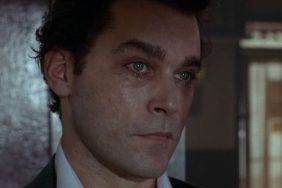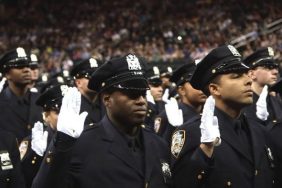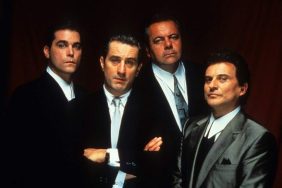Most people go to the movies to escape from reality. And yet many films begin with those five little words: “Based on a true story.” Or “inspired by a true story” if the filmmakers took more liberties than usual. Real life is, and you can tell this if you look at the news on any given day, full of fascinating tales of overcoming adversity, succumbing to tragedy, falling love and engaging in violence. Sometimes all four at the same time. Those movies are often “true crime” movies.
And so we get movies like this weekend’s Black Mass, based on the true story of notorious mobster James Joseph “Whitey” Bulger, Jr., who is currently serving two consecutive life sentences (plus five years) for his many crimes. And apparently, according to our review, it isn’t the best true crime movie ever made.
So what is? We asked our critics – William Bibbiani, Witney Seibold and Brian Formo – to decide once and for all. Each of them only gets to pick one film to serve as the pinnacle of the true crime genre. And as usual, they all picked different films from throughout the history of cinema. One of them even picked a documentary (it doesn’t get much truer than that).
Find out what they chose, let us know your favorites, and come back every Wednesday for more highly debatable installments of Crave’s The Best Movie Ever!
Previously: The Best Movie Ever | Richard Gere
Witney Seibold’s Pick: In Cold Blood (1967)

Columbia Pictures
Crime in movies is sexy. Assassins are always elitist, wealthy professionals who live in nice mansions, and own secret stashes of thousands of guns. They are also presented as having more professional integrity than your average brain surgeon or UN diplomat. Bank thieves are also typically presented as gentlemen of the world. They are people who think ahead, and live outside of the normal rules of security planning, virtuous by dint of their vast intelligence. Italian gangsters are emotional tough-guy family men and devout Catholics who would be pillars of the community, were it not for the extortion and murder. The only type of criminal who is not serially glamorized is the drug dealer, who inevitably gets hooked on drugs and dies penniless in a seedy motel. But until then, they still live pretty wild lives.
In real life, however, criminals are more like Perry Smith and Dick Hickock who, in 1959, murdered the Clutter family in a bungled robbery. These two men were not charmers, or even particularly smart. They were just ordinary, down-on-their-luck, hard-fisted, desperate men who needed money for the regular grind of day-to-day living. Alone, they would have been run-of-the-mill burnouts, probably working a string of factory jobs out in remote areas of the country. Together, however, they sort of became a criminal unit, each sort of goading one another into committing a horrible atrocity together. They were caught, tried, and executed in 1965.
I feel like I know all about Perry and Dick. In 1967, Richard Brooks’ kitchen sink crime film In Cold Blood – based on the biography by Truman Capote – hit theaters, and it educated the world about the real functions of the criminal mind. They are not wicked deviants, but sad, lonely men. This was a naturalistic, bare-bones recreation of a terrible crime that did not shy away from the sadness that drives some people to desperation. There is a cloud of melancholy hanging over In Cold Blood, expertly represented by Scott Wilson and Robert Blake. Wilson plays Dick like a smiling huckster and default leader. Blake plays Perry like a clueless thug looking for a way out of… anything really. There is nothing sexy about In Cold Blood. It’s a harsh, dirty look at crime, at criminals, at the criminal justice system, about the morals of federal execution. It’s sad, sterling, and amazing.
Brian Formo’s Pick: The Thin Blue Line (1988)

Miramax Films / Umbrella Entertainment
I’m tempted to choose David Fincher’s Zodiac as the best true crime movie ever—but its narrative leans heavily on implying that it’s solved a case that is still considered unsolved. I’m also tempted to choose Terrence Malick’s Badlands because it’s one of the best movies ever. There are other great examples, but there can only be one answer to this posed question: Errol Morris’ The Thin Blue Line. Why? Because it’s the only movie that created a new trial due to the evidence it presented—and helped get the person in question off death row. And cinematically, Morris’ filmed reenactments greatly influenced ALL of true crime television.
The Thin Blue Line doesn’t recreate one of the great crimes of the century. It involves two strangers who drank booze together, smoked weed together, went to a drive-in movie together, and then one of them shot a police officer. One was a teenager, the other was in his 20’s. One implicated the other. The other said they didn’t know what happened because they were drunk, stoned, and sleeping. The one in the 20’s was charged because a death penalty could be sought, despite overwhelming evidence that the other did it. Both were poor and “justice” for a fallen officer could be swift.
Morris’ documentary catches five people in perjury in video interviews. It doesn’t present the implicated man as an angel—just a victim of circumstance and slacker malaise. The reenactments are shot with steely blues and blacks, complete with close-ups of the smoke from a gun, and actors who are merely bodies that need to recreate the exact movements the victims and perpetrators did. The Thin Blue Line might seem less special today because its entire approach has been replicated by Unsolved Mysteries, 48 Hours, The Forensic Files, The FBI Files, The Jinx, etc. But it got a man out of jail—adding to its true crime pedigree as the truest of them all.
William Bibbiani’s Pick: Goodfellas (1990)

Warner Bros.
“As far back as I can remember I always wanted to be a gangster,” Henry Hill tells us, right after the almost-corpse in his trunk gets officially corpsed by a stabby Tommy DeVito and a shooty Jimmy “The Gent” Conway. The allure of the gangster lifestyle has led Hill to this moment, and by the end of the film, when he’s eating pasta with ketchup instead of spaghetti sauce, he’s probably asking himself the same question we would like to ask him: was achieving that dream even worth it?
In a nutshell, that’s Martin Scorsese’s Goodfellas. It’s probably the best true crime movie ever made, and certainly one of the best movies, period. Goodfellas understands the allure of criminality, the movie star glamor and the wild west lawlessness, and it understands the cost of giving up a conventional lifestyle. It illustrates every exciting and depressing and exhilarating and paranoid moment of a gangster’s existence, and it’s a joy to behold, if only in the comfort of a theater.
One could comment on the plethora of classic moments (“What do you mean I’m funny?”) and the influential shots (oh, that Copa Cabana), but what really counts is that Goodfellas is a crime saga that never devolves into a cautionary tale. What Henry Hill gains is almost as good, if not better, than what he loses. He wanted this life and he got it and he pays some but not all of the consequences. Martin Scorsese’s best film captures the criminal existence without an agenda, other than to say that this is what being a criminal is all about, from all the angles. Make your own decisions based on that information, and don’t ever, EVER piss off Tommy DeVito.







